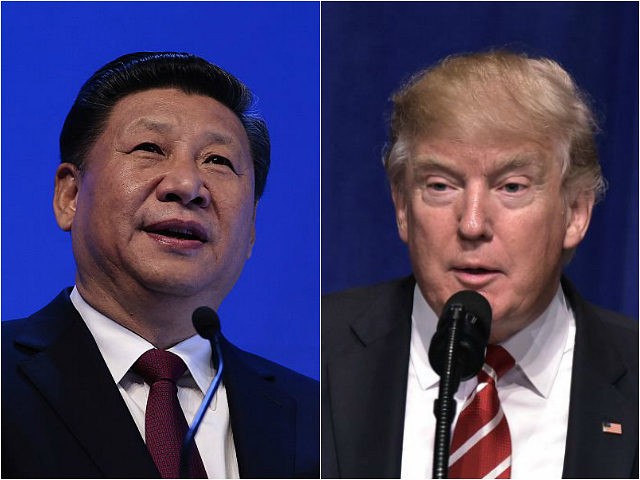U.S. President Donald Trump affirmed to Xi Jinping, his counterpart in Beijing, his support for the “One China” policy when they spoke on the phone Thursday, a conversation the White House described as “lengthy” and “extremely cordial.” The One China policy denies the sovereignty of Taiwan.
The move appears to have dampened criticisms by left-wing media that Trump was risking a major international conflict by challenging Chinese imperialism in the region, but it raises questions about how his newfound relationship with Xi will affect a weeklong visit from Beijing’s greatest rival on the international stage, Japanese Prime Minister Shinzo Abe.
According to a White House readout of the late-night call, Trump and Xi “discussed numerous topics and President Trump agreed, at the request of President Xi, to honor [the] ‘one China’ policy.” The White House version of events does not add any information about the policy discussed during the call, only that diplomats will soon “engage in discussions and negotiations on various issues of mutual interest.” The White House emphasized that the call was “extremely cordial” and was expected to be the first of many such conversations.
The Chinese version of events echoes the White House statement on the call. State media outlet Xinhua reported that Xi said, “China is ready to boost mutually beneficial cooperation with the United States in various fields such as trade and economy, investment, science and technology, energy, culture and infrastructure.”
“The necessity and urgency of strengthening China-U.S. cooperation is further increased in the face of the current complicated international situation and various challenges,” Xi added, according to Xinhua’s report about the phone call. Xi also expressed gratitude and relief at Trump’s confirmation that he would adhere to the One China policy.
China regards Taiwan as a breakaway province, disregarding that it functions as a sovereign democracy with a president as a head of state. To engage in any diplomatic relations with China, the Communist Party requires nations to agree that Taiwan is not a sovereign nation. In praising the communication between the two leaders, Chinese Foreign Ministry spokesman Lu Kang reiterated the significance of this policy on Friday: “Ensuring this political basis does not waver is vital for the healthy, stable development of China-U.S. relations.”
Lu had “highly commended” President Trump for a letter he sent Xi on Wednesday wishing the Chinese president and the people of China a happy Lunar New Year and Lantern Festival, a Chinese holiday occurring on Saturday. The letter appears to have led the way to the phone call Thursday night.
President Trump seems to have violated the One China prerequisite shortly after his election. As President-elect, Trump accepted a phone call from Taiwanese President Tsai Ing-wen congratulating him on winning the presidential race. As this was the first communication between the heads of state from the two countries since President Richard Nixon established diplomatic relations with China, Beijing sternly objected to legitimizing Tsai, despite the benign content of the phone call. Trump responded to the criticism by suggesting that everything is on the table when foreign countries negotiate with his White House.
The Taiwanese government does not yet appear fazed by the Xi-Trump conversation. Speaking to Reuters, a presidential spokesman said that “it was in Taiwan’s interest to maintain good relations with the United States and China,” without elaborating.
Why Trump agreed to the One China policy after suggesting he would only do so if the United States benefitted from doing so remains unclear. Chinese state media gave at least one possibility on Friday: Beijing may soon allow more Hollywood movies to screen in China, with more revenue going back to the United States.
The Global Times, a Chinese government-run publication that routinely predicts war with the United States, put on a much friendlier face than usual on Friday morning. “It is the right time for both nations to return to the negotiation table and open China’s door wider,” the newspaper quotes a Beijing-approved “film industry analyst” as saying. “US film producers are currently keen on exploring China’s huge box office bonanza, which has become the world’s second-largest movie market.”
“The share of revenues going to US distributors is also expected to move toward the international average of 40 percent,” the article continues, noting that Trump himself has a contentious relationship with leftists in Hollywood and suggesting this may influence U.S. policy towards the industry.
In addition to potential trade benefits, the Trump-Xi call likely assuaged concerns in Beijing about Japanese PM Abe’s visit to the United States on Friday. Abe is expected to discuss trade in the Oval Office with the president, then later spend the weekend at Trump’s estate in Mar-a-Lago. A senior administration official told reporters on Thursday that they will discuss “the bilateral relationship, the security piece of the relationship, as well as the economic.” They will “also [talk] about matters of mutual interest regionally and globally” during their working talks and a working lunch in Washington. A stronger relationship with Xi will likely lend Trump leverage in negotiating economic issues with Abe, of whom Beijing is suspicious.
At Mar-a-Lago, the two heads of government will spend quality time playing golf and getting to know each other.

COMMENTS
Please let us know if you're having issues with commenting.